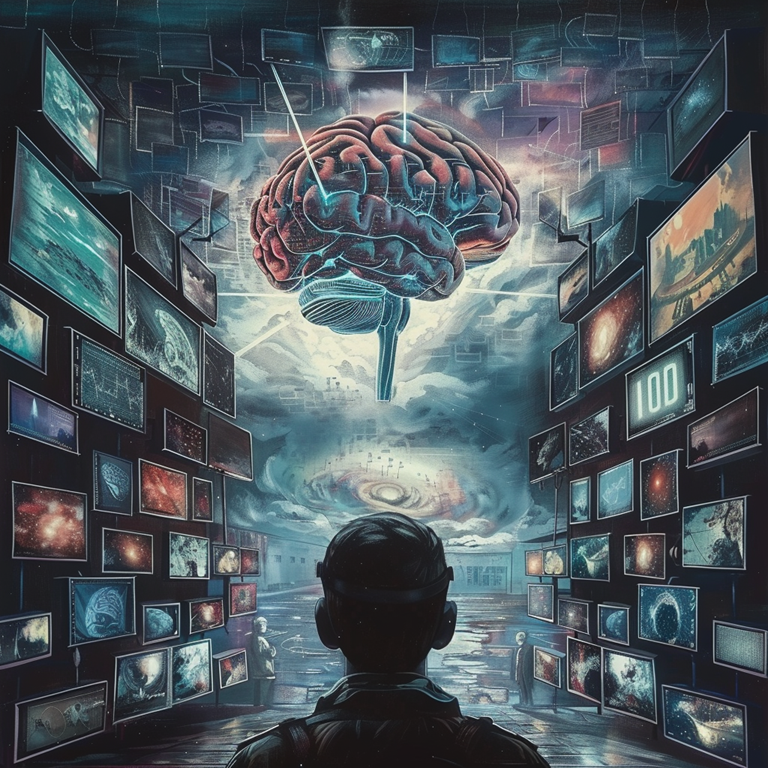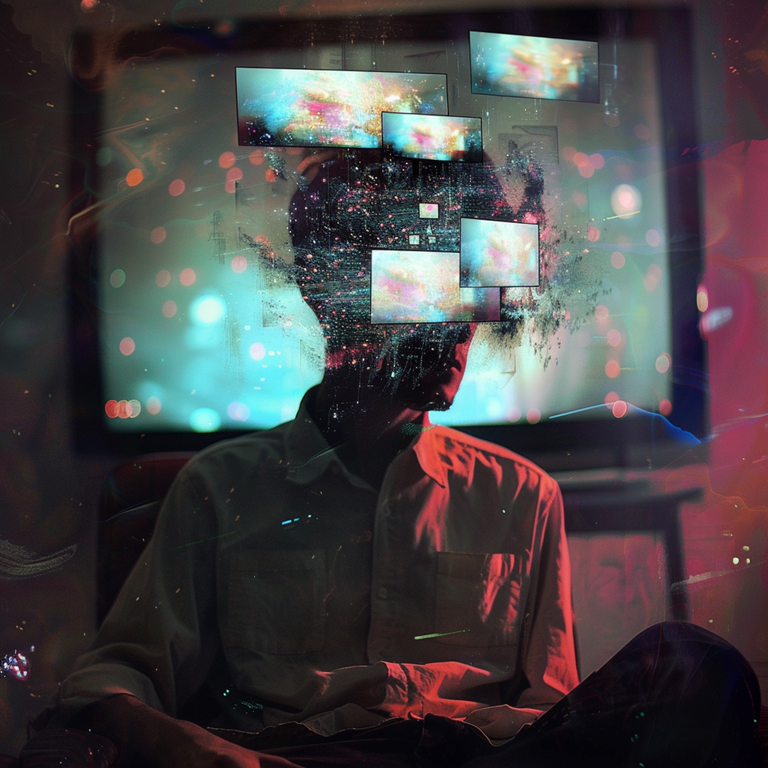The Internet has become a ruthless machine of mass indoctrination that shoves standardized beliefs, values, and behaviors down humanity’s throat. This process can severely compromise the natural, healthy development of a person’s individuality. If we don’t protect ourselves, we risk falling into a true digital dystopia.
Before the advent of the Internet, people dealt with emotional and spiritual problems by relying on friends, family, or religion. Nowadays, we look for solutions online, and the Internet—whether right or wrong—always has an answer.
How the digital dystopia reshapes your beliefs
Those Internet answers often exist within the frame of a larger belief system. The more you rely on them, the more they lead you down the rabbit hole of the ideology that contains them, potentially serving as a gateway to it. One minute, you just want to know why your girlfriend left you; the next, you are a hardcore Redpiller.
Instead of slowly forming our own belief systems by exploring and reflecting on our experiences over time, we often assimilate prefabricated ideologies like children choosing candy over broccoli. And we might not even notice: the digital dystopia influences our minds inadvertently, one sentence at a time, day after day.
The reason our minds are so prone to this subtle indoctrination might lie in the spiritual void we inhabit. The West lost its Christian faith in the last century, but people’s spiritual needs haven’t disappeared.1
In our post-religious, consumerist era, belief systems have become commodities that follow the market law of supply and demand: there is an ideology for every sensibility. Red and black pills, radical feminism, and wokeism are just some examples. Many influencers and online gurus create their own micro-ideologies too, acting as de-facto cult leaders.
People will choose an ideology that confirms their biases, provides an explanation for their suffering, and offers an apparent solution to their problems. Bonus points for providing excuses for their shortcomings and creating an enemy in which to project blame.
The more we buy into these ideologies, the closer we get to the extinction of independent thought in the ideological nightmare of digital dystopia.

Woke or red pill: similarities beyond the surface
At first glance, all these new faiths seem very different from each other, but a closer look reveals striking similarities between them:
Identity fusion
People become deeply invested in the ideology—emotionally and psychologically. In the most severe cases, the follower’s mind becomes entirely possessed by the ideology’s creed.
Loaded language
Ideologies create loaded jargon that infiltrates ordinary language: hoe, notch count, escaping the matrix, toxic masculinity, rape culture… Everyday language has a sense of legitimacy attached to it. Nobody doubts that words like “chair,” “table,” “day,” and “night” describe objectively true things. Therefore, if the ideology succeeds at introducing its loaded terms in normal, everyday speech, their meaning becomes a self-evident truth in the minds of both speaker and listener, warping their sense of reality.
Behavior control
Ideologues operate on rigid moral frameworks and models of behavior. Strict rules determine what’s considered good and evil.
Tribalism
Belief systems generate group identities, and their followers develop a sense of belonging, making it difficult to abandon their beliefs. The most fanatical ideologues may become isolated from their friends and family; their submission to the ideology is more powerful than their old social bonds.
Ideologies create “us versus them” mentalities that fuel social division. They emphasize our differences using antagonistic and politically charged language. They ridicule and demonize the opposition, preventing us from empathizing with each other and understanding other points of view. Ideologues might recognize the fanaticism and irrationality of others while being oblivious to their own.
All of this ends up dividing people into irreconcilable camps.
Emotionality
Ideologies evoke strong emotional responses, such as fear, anger, outrage, or pride, severely hindering critical thought. Those emotional spikes are the drug the digital dystopia deals. When taken to extremes over long periods, these emotional states can be very harmful to an individual’s mental health.
Fanaticism
Relativism and skepticism are considered weak and lacking commitment to the cause. Ideologies demand taking sides, often at the expense of one’s conscience and sanity.
Scapegoating
Ideologues always have external enemies to blame. This might feel good in the short term because it alleviates guilt and lifts the weight of personal responsibility. However, it deprives people of their sense of agency and hinders their ability to take control of their lives.
If your beliefs reflect many of these characteristics, your mind might have been contaminated by ideology.
Ideologies are religions in disguise
Ideological contamination comes with a serious problem of self-awareness. Generally speaking, religious people know their beliefs are fundamentally rooted in faith. However, ideologues don’t seem to realize that, in that sense, their beliefs are religious, too.
Since ideologies don’t rely on explicitly supernatural elements (like the birth of a child god from a virgin mother), their followers are convinced that their beliefs are rationally justified. Therefore, alternative perspectives are not only considered morally wrong but also scientifically and factually wrong.
The ideologue’s profound conviction that they are right makes them completely closed to different points of view, which easily leads to feelings of animosity towards those who are “wrong” or “evil.”
A one-size-fits-all that constrains the human spirit
The profound psychological investment ideologies demand, paired with the prefabricated answers they propagate, can prevent people from developing their own beliefs through the slow and autonomous expansion of their perception and understanding.
Every person on this planet is unique on some level. Except for twins, there are no genetically identical humans. No two people have lived through the exact same experiences either.
However, ideologies are designed to be followed by millions who must integrate them as they are, with few concessions to their individual spirit. This can generate severe cognitive dissonance because an ideology rarely fits an individual perfectly.2
Friction between the ideology and a person’s conscience is almost certain. For an ideology to take root in the psyche, one must sacrifice his true essence to some degree, which creates internal division.
A belief system formed autonomously reflects an individual’s essence much more authentically than any ideology ever could. In the long run, this should result in a better alignment of mind, body, and action—a healthier mental state than the one ideologies generate.
Religious fanatics accept every tenet of their religion without question, in the most literal and absolute sense. The same can be said for radical ideologues—woke, conservative, you name it. Those are the kind of fanatics that will prevail in the digital dystopia.
A healthy outsider perceives all fanatics as mentally unsound. He observes how out of touch they have become with reality, their individual essence, and their unique desires. A strong mind wants to assert itself, not surrender to a common, “greater” cause.
So why do people adopt those belief and behavior systems? What circumstances lead them to surrender their individuality to the digital dystopia? There are a few reasons worth discussing.
Ideologies alleviate the anxiety of uncertainty
Everybody experiences pain—physical, mental, and emotional. That’s an inescapable truth. We may suffer due to mistakes or bad decisions, but also for completely undeserved circumstances. Suffering, like joy, partially depends on factors we can’t control.
Nietzsche famously said: “He who has a why to live for can bear almost any how.” If our pain has some kind of purpose, if we see it as the road to a higher estate, we tolerate it more easily. We may even seek it voluntarily, like a runner who trains for a marathon.
But if our suffering seems underserved and meaningless, it becomes much harder to bear. In the most severe cases, it can lead to nihilism or a generally negative view of life, which can have catastrophic consequences.
Traditionally, religion protected us from such conditions, providing reassurance and guidance in moments of profound uncertainty. Most people still need that spiritual safeguard.
Science has been quite successful at replacing religion in answering questions about matters such as the cause of rain and the origin of life on our planet. However, it has not managed to fulfill humanity’s thirst for faith.
Something, then, had to fill the spiritual void left by religion. And that something has taken the form of a myriad of ideologies that have infiltrated our minds.
Ideologies exploit our vulnerabilities
When life’s good, it seems we can do away with faith. But as soon as shit hits the fan, we desperately look for new ground to stand on. That’s when we become more vulnerable to ideological indoctrination.
Ideologies thrive on lost souls, providing their broken belief systems with new structures. They numb the pain with compelling explanations, absolute answers, and people to blame. They offer certainty in times of chaos.
It’s no coincidence that nazism rose to prominence when Germans were enduring terrible economic hardship and very low morale after their defeat in the First World War.
Modern technology and the advent of the digital dystopia
Modern technology could be amplifying our propensity to fall for ideological indoctrination.
In the first stages of their history, humans had very limited access to information. The tribe and its ancient myths were our main influences. In the face of pain and uncertainty, we had no way of finding ready-made answers outside the advice of relatives, friends, or the tribe’s sage. In a life crisis, you had to endure the pain while patiently looking for a way out. You had to find the exit by yourself.
Later on, large-scale power structures emerged in the form of widespread organized religion and political superpowers, from the first empires to modern governments. But for the most part, humans retained an essential parcel of mental freedom in the intimate realm of their private lives. If a king, priest, politician, or con artist wanted to deliver a message to influence people’s minds, they needed to do it at a specific moment and place.
Nowadays, that’s no longer the case. We’re more isolated from friends and family than ever before. We’ve become addicted to our phones, which means we’re basically always online. The Internet and mass media corporations have become our spiritual guides, our priests in the digital dystopia.

Modernity offers a virtually infinite supply of ready-made answers to every problem, anytime. Those answers come in all shapes and flavors, and anyone can quickly find one that they are willing to accept and assimilate with little resistance. In a moment of crisis, many will do just that.
The subtle art of large-scale manipulation
People are more susceptible to manipulation when they feel negative emotions, and those who want to influence others have learned to exploit that phenomenon. One of the main reasons people are falling prey to ideology is found in the science of persuasion.
When the advertising industry boomed in the 20th century, ad men soon learned that one of the most effective ways to get customers to do what they intended (in this case, buy their product) was to identify and exploit people’s pain points—their most hurting psychological and material issues.
Then, immediately after people’s emotions had been stirred, while their feelings of anxiety and insecurity were most intense, they would push a narrative that presented the product as the solution to their problems.
That strategy is now present everywhere. Politicians, advertisers, and influencers have strong incentives to push narratives that exploit pain points or even create new ones. Ideologies are not an exception. They, too, twist the knife in people’s wounds while offering the cure.
The Internet amplifies the effects exponentially by providing manipulators with a virtually infinite reach.
Escaping the digital dystopia: individualism is the answer
Ideologies are a strong temptation for a mind that faces existential dread. But in most cases, they are toxic medicine. If you allow them, they will feed on your soul until there’s nothing left. To overcome existential dread and thrive in the face of it, we must take the reconstruction of our minds into our own hands and develop our own belief systems. We can escape the digital dystopia by reclaiming our individuality.
In your hardest hours, your mind can exert tremendous energy rearranging itself, trying to make sense of the past, and looking for a new way forward. The process can be long and strenuous. Some wounds take months or even years to heal; in the meantime, you will feel lost and hurt. And, despite the false promise of certainty ideologies offer, in the real world, we must accept that there are some events in life we will never fully understand.
Accepting these facts is the way to accomplish true personal growth. Only then can you manifest your personality’s full potential and develop your character in a way that better suits your unique essence.
The old self must die to reemerge higher, wiser, and stronger. That death can be slow and painful, but it’s a necessary process to reach new heights.

Leave a Reply